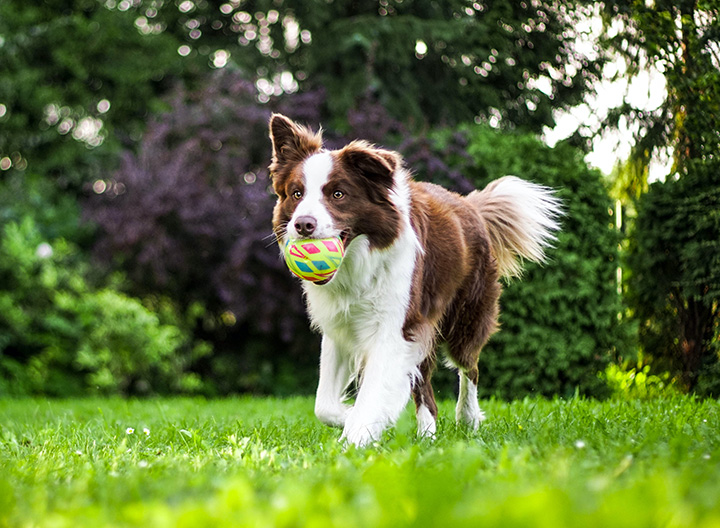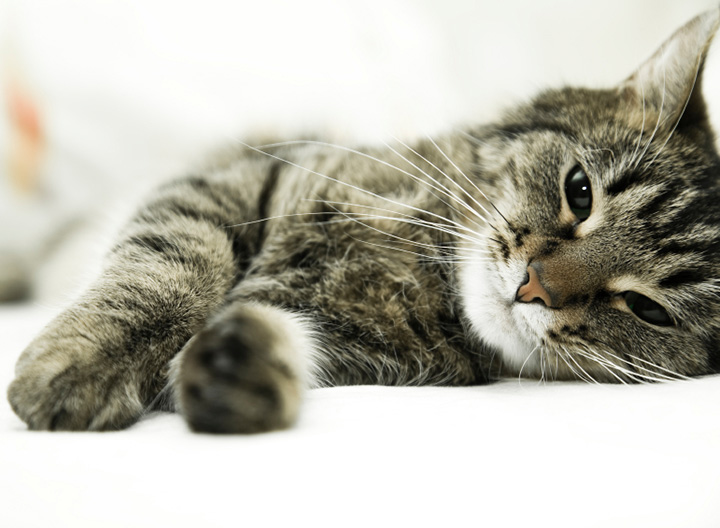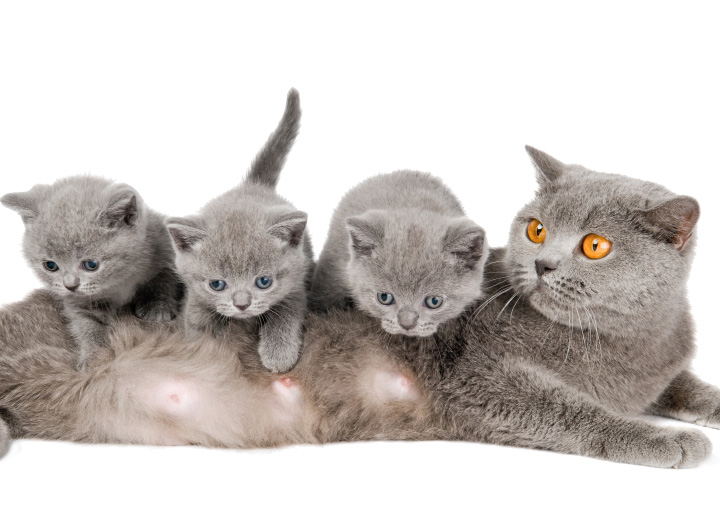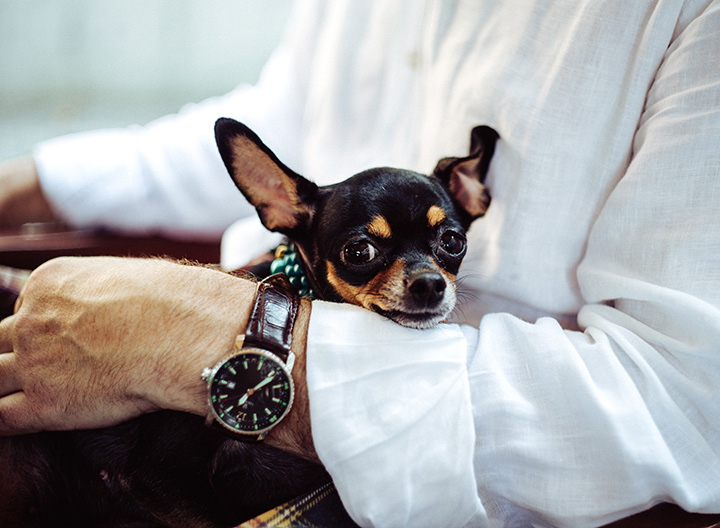Dogs
Vaccination
Vaccinating our dogs against certain infectious diseases has greatly reduced their incidence. Nevertheless, these diseases are still present in the canine population and represent a very real risk.
In the Weybridge area we have a prolific urban fox population. Foxes can act as a reservoir of the infectious canine diseases we and therefore it is even more important to vaccinate our dogs.
Our canine vaccine protects against the following diseases:
- Distemper Virus
- Adenovirus Type 2
- Parvovirus
- Parainfluenza virus
- Leptospirosis canicola
- Leptospirosis icterohaemorragiae
The vaccine is injected under the skin in the “scruff” of the neck. A very small needle is used and many dogs do not even feel it.
Annual vaccination is required to keep your dog protected against all the diseases listed above. This is because antibody levels start to decline with time after your dog’s last vaccination. Antibodies against Leptospirosis in particular, have been clinically proven to decline to baseline levels over the course of a year, leaving your dog unprotected.
Dogs can be infected with Leptospirosis following contact with rat’s urine in waterways (“Weils” disease in humans) and causes acute kidney or liver failure.
The annual “booster” consultation includes a thorough clinical examination to check your dog is healthy. This is an invaluable opportunity to identify any problems early, before they cause obvious signs of ill health, for example dental disease, heart murmurs, cataracts etc.
Puppy Vaccination Courses
We advise the following puppy vaccination course:
FIRST VACCINE: 8 weeks old
SECOND VACCINE: 2-3 weeks after the first vaccine
Your puppy should not be allowed outside for 1 week following his second vaccination. This is to ensure his immune system has sufficient time to respond to the vaccine and produce protective antibodies.
Why do we advise vaccination at 8 weeks and 10-11weeks old? If vaccines are given too early, the very young puppy still has antibodies from his mother’s milk circulating and his own immune system will not respond properly to the vaccine. When his maternal antibodies have waned, he will not possess his own protective antibodies and should he meet one of the above diseases, he will be infected.
If vaccines are given too late, the older puppy may have missed a valuable “window” for his socialisation. His social development depends on interacting with other dogs at a young age. If this is not done he may be fearful of other dogs as an adult, often manifesting as “fear aggression” where the nervous dog lunges on the lead and barks incessantly.
The age at which this “window” closes varies between individuals and between breeds. The German Shepherd Dog is thought to have a short period of optimal socialisation whereas the Labrador has the longest. However, these vaccination ages are not set in stone. For example, if you have taken on an older rescue puppy or dog which has not been vaccinated then the course should still be given 2-3 weeks apart.
Kennels will require your dog to be up to date with his annual boosters. Most of them also require kennel cough vaccine, which should be given at least 14 days prior to admission into kennels.
Some pet insurance companies invalidate your insurance if your dog does not have annual boosters. Obviously, they do not want to pay out for hospitalisation and critical care of patients with diseases which could have been easily prevented by vaccination. Also, the annual health check performed prior to the booster often catches diseases at an early stage which means the cost of rectifying the problem is simpler and costs them less!
In recent years, several distressing cases have been reported, in which puppies have died from parvovirus following “homeopathic vaccination.” Parvovirus is a devastating disease which causes severe, bloody vomiting and diarrhoea and is often fatal in young puppies. Sadly, even with intensive care and hospitalisation, whole litters of puppies often succumb if they have not been adequately vaccinated.
There is no substitute for vaccination, as the very concept demands that the vaccine contains an inactivated form of the pathogen which causes the disease. The vaccinated animal’s immune system responds by producing protective antibodies against the “foreign agent”. These protective antibodies are then present in the circulation and should your dog be exposed to the live virus or other pathogen, they will multiply attack and destroy it. Homeopathic “nosodes” are not true vaccines and therefore cannot confer protection in this way.
Intestinal Worms
Roundworm
The roundworm toxocara may be present in puppies at birth, as the larvae can cross the placenta from the mother. Puppies may also be infected after birth through the mother’s milk or by ingesting larvae in the environment (for example by eating infected rodents or birds).
Roundworm causes lethargy, bloating, diarrhoea and weight loss. If your new puppy is ravenously hungry and has a distended abdomen then there may be roundworms in his intestine.
Children can pick up the toxocara worm if playing in parks contaminated by dog faeces. Although disease in humans is rare it can result in blindness and possibly epilepsy.
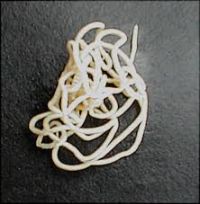
Picture Above: Toxocara canis (the dog roundworm)
Tapeworm
The two most common species of tapeworm in England are Dipylidium and Taenia. Dipylidium tapeworms are transmitted by fleas so dogs which have had flea bites often have tapeworm too. The dog becomes infected after swallowing a flea when grooming or chewing the coat.
Dogs that scavenge or hunt may become infected with Taenia tapeworms. Segments of the Taenia tapeworm may sometimes be seen as tiny rice grains around the anus and can cause itchiness around the anal area.
The dog and fox tapeworm Echinococcus multilocularis, is not presently found in the UK. Humans can be infected with this tapeworm which causes severe cysts in the liver, lungs and brain. For this reason, all dogs travelling in Europe must be treated with a drug containing praziquantel 24-48 hours before returning to the UK. Please see our section on "Pet Passports" for more information.
Whipworm
Whipworms are seen more commonly in kennelled dogs and cause diarrhoea.
Hookworm
Hookworms can cause anaemia (leading to lethargy and breathlessness) as well as diarrhoea in dogs. The hookworm can also burrow into human skin and cause and red lesions.
It is important to treat dogs regularly to prevent infestation with these intestinal worms. We advise worming puppies every 2 weeks until 12 weeks of age, then every month until 6 months of age and then every 3 months as an adult dog.
We provide a broad spectrum worming tablet called "Milbemax" which kills all the above worms. It is available as "Milbemax puppy/small dog" (for dogs under 5kg) or as "Milbemax dog" (1 tablet for dogs 5-25kg, 2 tablets for dogs over 25kg.) Most dogs are easy to tablet, but for those fussy dogs who are not, "Milbemax" is also available in a palatable chew-treat form.
Lungworm
Lungworm is extremely prevalent in the Weybridge area and is potentially fatal to dogs.
Please see our dedicated "Lungworm" section for full information. Lungworm can cause coughing, bleeding and neurological signs. It is carried by foxes and passes out in their faeces to infect slugs and snails. Dogs are infected after eating these slugs or snails, whether deliberately or accidentally (drinking from puddles, eating grass).
Prevention is possible by application of a spot-on preparation called "Advocate" to the skin on the back of your dog’s neck. This product should be applied every 4-5 weeksand also protects against fleas, Sarcoptic Mange ("fox mange"), ear mites and roudworms.
Fleas
Fleas have become a year-round problem since central heating ensured our houses are always warm enough for their life-cycle. The most common flea found on UK dogs is Ctenocephalides felis, the cat flea!
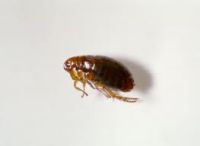
Picture Above: Ctenocephalides felis, the cat flea(not actual size!)
Dogs with fleas are itchy and the hair on their back towards the tail may become blunt and coarse from licking. Some dogs may cause trauma to their skin by persistent chewing and licking. The skin may become moist and infected or crusty scabs may form in the coat.
You may see adult fleas but often only the "flea dirt" (flea faeces) is visible when you part the hair. It is possible to distinguish "flea dirt" from other dirt by performing the "wet paper test". Wet paper rubbed onto ordinary dirt will leave small dirty marks whereas flea dirt will leave red trails (your dog’s blood!)
Some dogs are hypersensitive to flea saliva and become intensely itchy after even on flea bite. These dogs often have inflamed red skin and crusting scabs and the syndrome is termed "Flea Allergic Dermatitis" (FAD).
In young puppies, heavy infestations of fleas can cause anaemia due to blood loss.
The dog flea also transmits the tapeworm Dipylidium caninum between dogs. Prevention and treatment is achieved by applying a spot-on preparation to the skin on the back of your dog’s neck. There are several veterinary-approved products available but be wary of some imitation products available in pet shops and supermarkets. Most of these imitators are ineffective and some can actually cause lesions on your dog’s skin.
We usually advise our clients to use "Advocate" spot-on to prevent fleas, as it has the added benefits of protecting against Lungworm, Sarcoptic Mange (fox mange), Roundworm and Ear mites.
Neutering
Neutering Male Dogs
Neutering male dogs is known as “castration” and involves the surgical removal of the testicles from the scrotum. Castration pre-empts undesirable behaviours such as aggression, excessive mounting and straying. This is because the effect of testosterone, which drives these behaviours, is removed.
Some owners are concerned that castration will change their dog’s personality, but this is not the case at all, as castration selectively affects sexual and aggressive behaviours. It is prudent to pre-empt these behaviours or stop them early by timely castration.
Dogs who are aggressive towards other dogs or people should be castrated, as in many cases this will resolve or improve the problem. However, owners should be aware that dogs who have been aggressive for some time before castration, may now find such behaviour intrinsically rewarding. For example, being aggressive may have allowed them to dominate other dogs or their owners, reinforcing the behaviour over a long period of time. In these rare cases, castration may not resolve the aggression as the behaviour is not purely motivated by testosterone.
Dogs which have not been castrated are also more likely to stray, attempting to find a mate. This drive is very strong and uncastrated male dogs may destroy property attempting to escape and are also over-represented in R.T.As (Road Traffic Accidents).
Advantages of Castration
- Prevents the breeding of unwanted puppies.
- Prevents undesirable, testosterone-driven behaviours , for example aggression, excessive mounting, straying
- Dramatically reduces the risk of prostatomegaly (enlarged prostate)
- Prevents testicular cancer
Castration is an operation which requires a general anaesthetic and as with all surgical procedures there is a very small risk from the anaesthetic and the surgery. However, with the advent of modern anaesthetics complications are extremely rare and the surgery is routine.
Neutering Female Dogs
Neutering female dogs involves the surgical removal of the uterus and ovaries (“ovario-hysterectomy” or “spay”)
If you have a female puppy and are not planning to breed from her, spaying is advisable due to health benefits. We advise spaying bitches at 6 months old. If your bitch is older and has already started her seasons, we advise spaying 3 months after the last season. This is to avoid complications like “pseudo-pregnancy” (phantom pregnancy) caused by hormone changes.
Advantages of Spaying
- Prevents the breeding of unwanted puppies.
- Prevents pyometra, a life-threatening condition in which the womb becomes infected and full of pus
- Dramatically reduces the risk of mammary cancer (breast cancer).
- Prevents your bitch coming into season and all of the inconvenience that this causes, for example blood loss and unwanted attention from male dogs
- Prevents uterine and ovarian cancer
Spaying is an operation requiring a general anaesthetic. As with all surgical procedures there is a very small risk from the anaesthetic and the surgery. However, with the advent of new anaesthetics, the risk is now extremely small.
A Spay is a major operation and owners should be prepared to keep their bitch quiet and on the lead for 7-10 days post-operatively.
In a few bitches, spaying increases the chance of developing urinary incontinence. This is uncommon and can be controlled successfully with drugs in almost all cases.
If you are considering breeding from your bitch, please phone the surgery for advice. Having puppies is a big commitment. There are many unwanted puppies in the UK and over 100,000 stray dogs are picked up by Local Authorities every year. If you are planning to have puppies, ideally you will have found a list of possible homes before they are born.
stgeorgesveterinarycentre@gmail.com | 01932 858890 | Find Us


